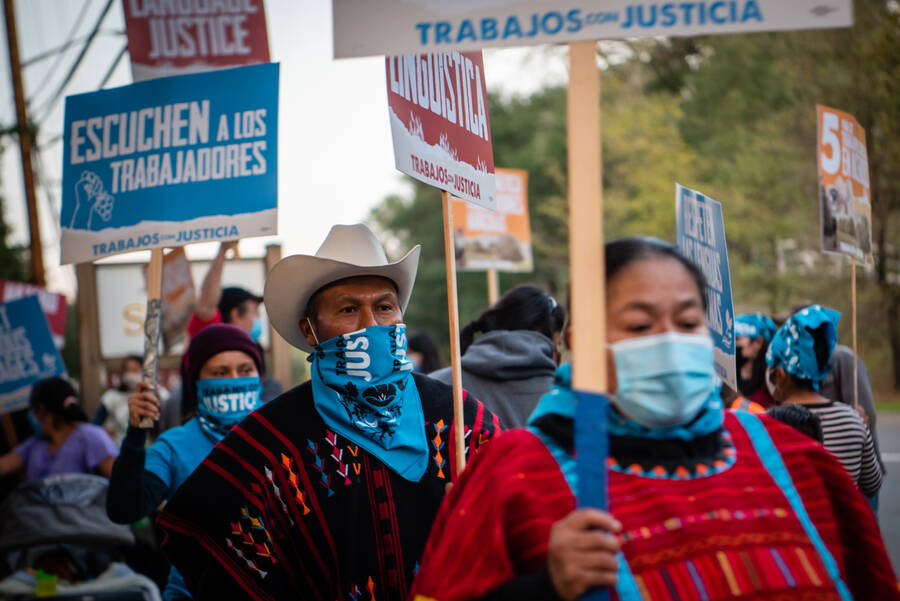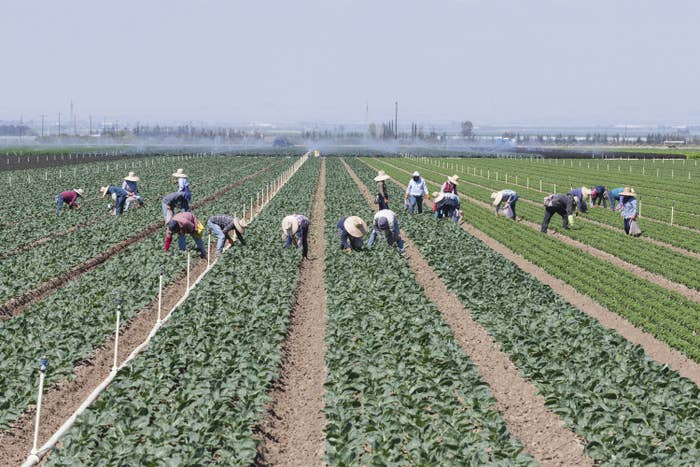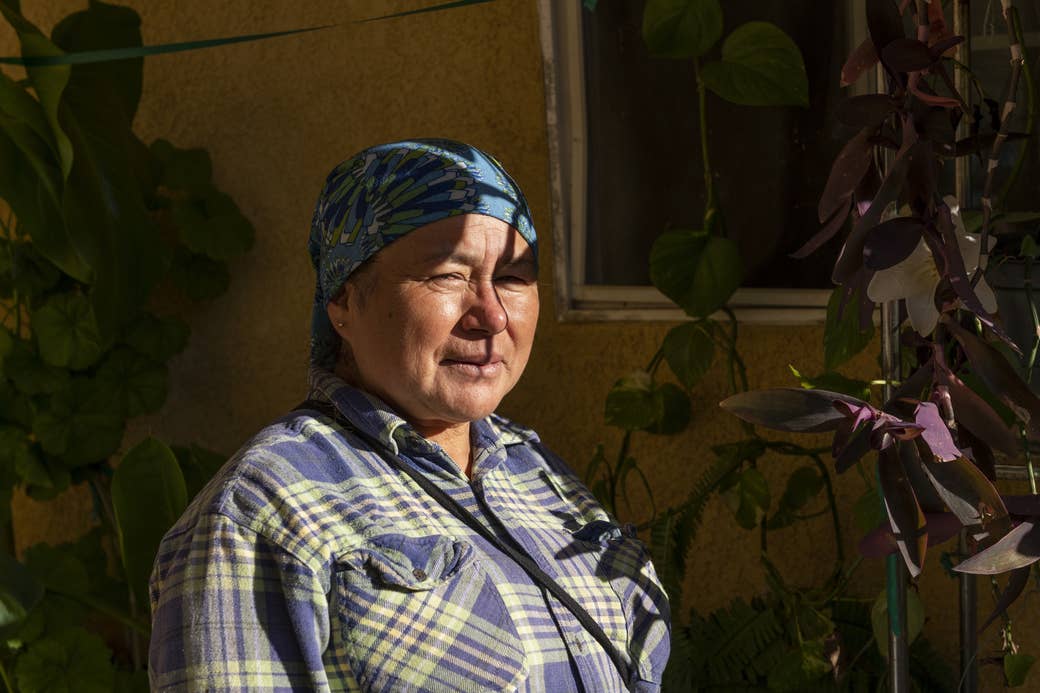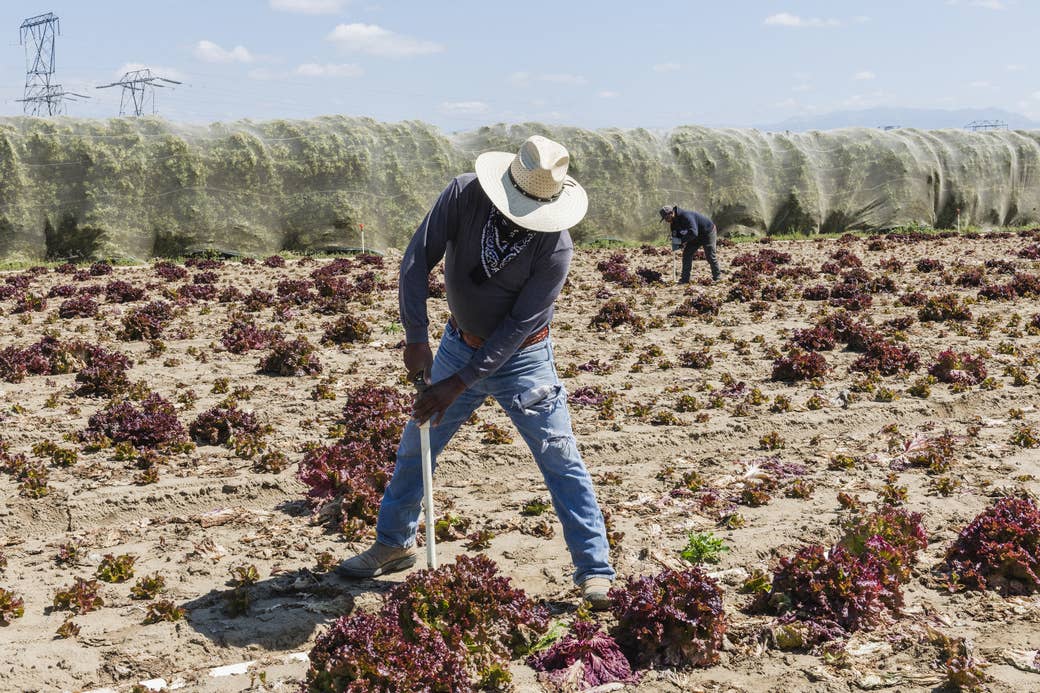Unlike corporate models, “worker-driven social responsibility” puts workers at the center of protecting their rights.
By Derek Seidman ,
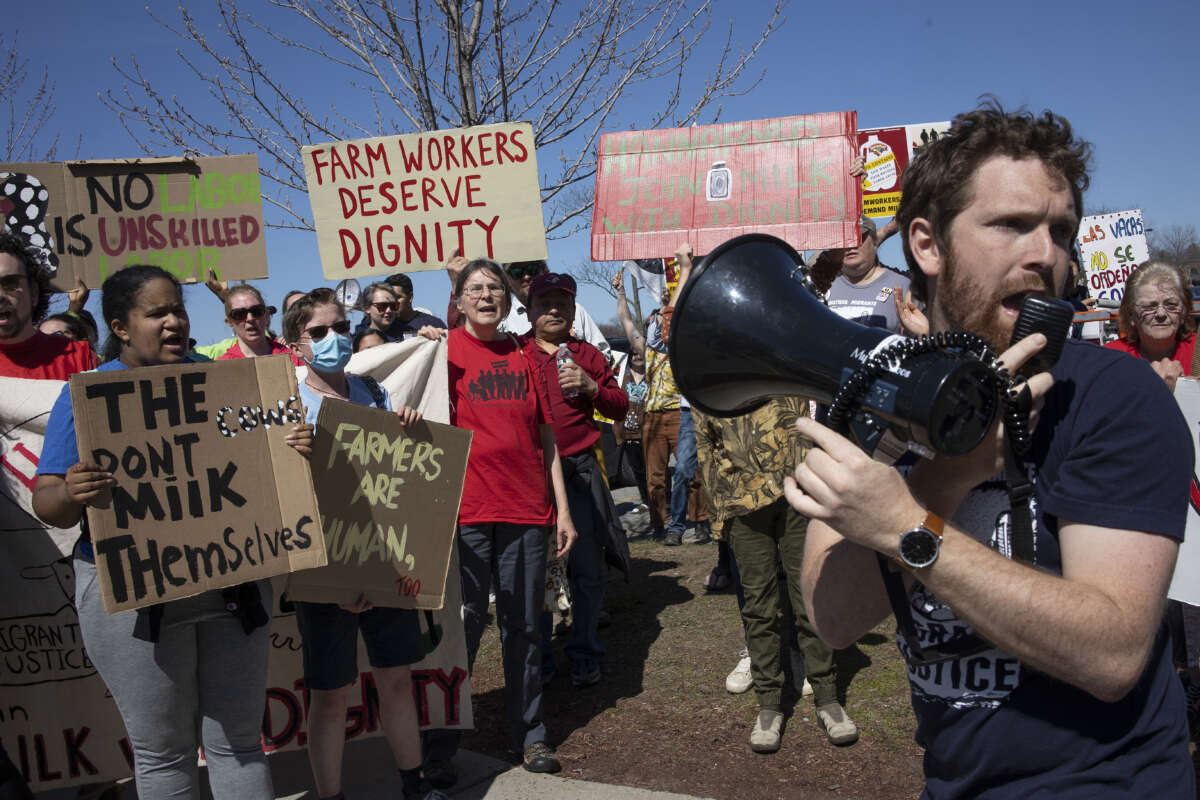
If you consume products from capitalist markets today — and, of course, most of us do — you’ve surely seen your share of labels on name brand items promising that your purchase is “ethical”: fair trade coffee, sustainable clothing. The list goes on.
Many of these efforts, however, amount to little more than corporate marketing, a kind of image control that became fashionable beginning in the 1990s with the exposure of horrid labor conditions across global supply chains. But one model has built up a proven record of upholding crucial protections for the most at-risk workers within those supply chains: worker-driven social responsibility (WSR).
Born out of bottom-up struggle at the turn of the 21st century by the Coalition of Immokalee Workers (CIW), WSR models are based on legally binding agreements with key supply chain actors that uphold worker-shaped codes of conduct that are strongly monitored and enforced, often by workers themselves, and are backed by market sanctions against violators. While corporate-aligned models have failed, numerous studies show that WSRs have been profoundly effective, in no small part because, for workers, “the need to develop and pursue an effective strategy to define, claim, and protect their human rights is existential, affecting their very lives,” writes Susan Marquis, a Princeton University professor, in a recent report.
Marquis’s report, published by Harvard Law School’s Center for Labor and a Just Economy and Clean Slate for Worker Power, surveys the failures of corporate social responsibility and multi-stakeholder initiatives against the successes of the WSR model. Marquis, who also wrote a 2017 book about the Coalition of Immokalee Workers, shows how the WSR model is expanding, and argues that U.S. federal policies could support its further growth.
RELATED STORY
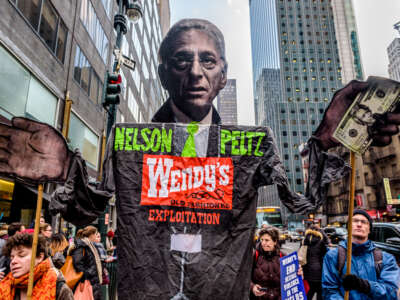
Farmworkers Push Wendy’s, Kroger and Publix to Take Stance Against Forced Labor
The Coalition of Immokalee Workers is pushing the companies to join the Fair Food Program, which deters forced labor. By Derek Seidman , TRUTHOUT March 11, 2023
Globalization in the 1980s and 1990s spurred a worldwide “race to the bottom” as corporations sought out workers whom they could pay pennies on the hour to labor under sweatshop conditions. Iconic brands like Nike and the Gap faced a slew of scandals over abuses in their supply chains. This created huge public relations headaches for corporations. In response, they set up corporate social responsibility programs (CSRs).
CSRs, writes Marquis, are corporate-run programs, sometimes containing auditing arms, with published standards around conditions in their supply chains on issues like human rights and sustainability. But as CSRs proved to be ineffective at addressing those issues, civil society groups, businesses, and other stakeholders came together to form Multi-Stakeholder Initiatives (MSIs), beginning in the 2000s and into the 2010s. These, which involve partnerships between corporations and civil society groups, and sometimes governments, were intended to address “governance gaps” in CSRs around issues like human rights abuses and sustainability.
But CSRs and MSIs have one thing in common, says Marquis: Neither really protect workers. “They were good for the brand but not effective at all for the workers,” she told Truthout. “You didn’t see any real change.”
The core problem, says Marquis, is that CSRs and MSIs fail workers by design. They are voluntary for corporations. Enforcement is lax. Neither put real power in the hands of workers, the very people best equipped to define standards, monitor violations and oversee enforcement.
“What’s inadequate about these models is that they are not centered on the workers,” said Marquis. Her claims are backed up by numerous studies, including a major 2020 report that concluded the MSI model “failed in its goal of providing effective protection against abuse.”
Anna Canning is the communications director for the Worker-Driven Social Responsibility Network, which works to promote and expand the WSR model. She says CSRs and MSIs deal with appearance more than substance.
“There are these ubiquitous fair trade labels,” she says, “but they’re failing to address the big power imbalances that colonialism and capitalism have instilled into pretty much every aspect of our food and trade systems.”
“There’s no way that you can make the kind of change that’s needed just through consumer choice,” said Canning. “All of that stuff exists in the realm of marketing. It does not exist in the tangible world of binding agreements.”
“The Power Was Not With the Growers, But With the Corporations”
In the 1990s and 2000s, another model for protecting workers’ rights was germinating in the tomato fields of Immokalee, Florida.
CSRs and MSIs fail workers by design. They are voluntary for corporations. Enforcement is lax. Neither put real power in the hands of workers
Farmworkers are not covered under the National Labor Relations Act, making unionization extremely difficult. Many are undocumented migrant workers or immigrants. Working conditions, historically, have been hyperexploitative, with violence and sexual abuse rampant, sometimes akin to slavery.
Originally a workers’ center fighting for better conditions for Florida’s tomato pickers, the Coalition of Immokalee Workers developed an analysis of their situation that centered on the broader supply chain they labored within.
Who, ultimately, held the structural power within that supply chain to improve the lives of farmworkers, they asked? It was not the field owners who hired farmworkers, but the corporate behemoths, the grocery and food service giants who dominated the retail purchasing of agricultural goods. Moreover, those corporations — the Taco Bells, the Trader Joes, the Walmarts — were susceptible to consumer pressure.
This analysis gave birth to the Campaign for Fair Food in 2001, which built an alliance between farmworkers and consumers, especially students and faith-based organizations, to educate the public about agricultural supply chain abuses and to pressure corporate retailers to end their complicity.
The first high-profile campaign was against Taco Bell. Farmworkers and their allies demanded the company sign a binding agreement to address abuses like wage theft among the growers in this supply chain. Victory at Taco Bell came in 2005, and other corporations followed: McDonald’s, Burger King, Chipotle, and more, including, in 2014, Walmart, the nation’s top grocer.
Under the banner of the Coalition of Immokalee Workers, farmworkers had created a social movement. They carved out a public voice. They reframed farmworkers’ rights as human rights. The media and elected officials started paying serious attention. They were altering the power relations in their supply chain.
The WSR model that the Coalition of Immokalee Workers began led to the creation of the Fair Food Program in 2011, which, to this day, is the core partnership through which the Coalition of Immokalee Workers achieves protections and gains for farmworkers.
Under the Fair Food Program, retailers and growers agree to abide by a “Code of Conduct” that is shaped by, and protects, farmworkers. This is cemented in a signed, legally-binding agreement that is enforced, largely, by workers themselves through regular education sessions and a multilingual 24/7 hotline. An independent body, the Fair Food Standards Council, conducts investigations into abuses and undertakes serious audits. The program also includes a Fair Food Premium that retailers pay that ends up in workers’ paychecks as a bonus. Any partnering grower found violating the code of conduct risks market sanctions that could cut off sales to the nation’s top buyers.
The Fair Food Program now covers multiple products in states across the U.S. and has expanded to several other countries. Its results have been widely lauded. The program received a Presidential Medal of Honor, and the UN Special Rapporteur in Trafficking in Persons called it an “international benchmark.” One labor relations professor said it was “the best workplace-monitoring program I’ve seen in the U.S.”
“We See Each Worker as a Monitor of the Program”
It was a little over a decade ago when Lupe Gonzalo first heard about the Coalition of Immokalee Workers. She had seen the rampant abuses in the agricultural industry: the poverty, the wage theft, the sexual harassment and, in extreme cases, working conditions akin to slavery.
Around 2011, she was working on a farm that had joined the new Fair Food Program. When the Coalition of Immokalee Workers visited to explain the agreement, she experienced something of an awakening.
“That was the first time that, as a farmworker, in over a dozen years of working in the field, I heard about my rights,” Gonzalo recalled. “It was the first time I felt like I was being seen as a human being.”
She was hooked. She got involved with the Coalition of Immokalee Workers and participated in protests and campaigns. She eventually joined the organization’s staff.
Gonzalo says the close and consistent contact between organizers and workers is crucial to the Fair Food Program’s effectiveness. “We go out to the farms and talk directly with workers,” she told Truthout. The Coalition of Immokalee Workers distributes materials and conducts educational sessions. They make sure everyone has the hotline number and knows what to do if there’s a problem.
“We see each worker as a monitor of the program,” she said.
Unlike with CSRs and MSIs, Gonzalo says, the Fair Food Standards Council conducts substantive investigations around complaints at farms. It tries to solve the problem. “They’re not just surface level investigations,” says Gonzalo. Audits involve interviewing “at least 50 percent of the workforce.”
She says the program’s success rests on it being worker-driven: “It’s the workers’ voice that’s leading to the solutions and protections for workers.”
“These Things Won’t Change Unless We Change Them Ourselves”
Soon, other worker organizations began to explore the WSR model. One of those groups was Migrant Justice, led by a community of immigrant farmworkers in Vermont, whose origins lay over a decade ago in the Green Mountain State’s dairy farms.
Thelma Gómez was 16 years old when she joined her father working in Vermont’s dairy farms in 2012. The icy weather was an adjustment, but worse was her boss’s refusal to pay her when paycheck time came around. “I felt in my bones it was unjust,” Gómez told Truthout.
Later that year, Gómez was invited to a farmworkers’ assembly. People discussed their experiences with ramshackle housing, poverty wages and grueling hours.
For Gómez, it was a revelation. “I realized that my situation wasn’t so unique,” she said. “Everybody was experiencing some form of labor abuse.” Moreover, it didn’t need to be this way. “The organizers of the assembly told us it doesn’t matter what country you came from: You have human rights,” she said.
Gómez threw herself into organizing with Migrant Justice. “I felt a responsibility and a commitment to this work because I came to understand that these things won’t change unless we change them ourselves,” she said.
Around that time, Migrant Justice had developed a “pyramid of power” analysis of the dairy industry that took the wider supply chain into account. The group heard about the Fair Food Program. Gómez soon trekked down to Immokalee with her young twin daughters to learn from the Coalition of Immokalee Workers firsthand.
“I was blown away by everything the CIW had accomplished,” she remembered. The key thing she took away from the WSR model was that farmworkers had to focus pressure on the top of their supply chains to win any rights for themselves.
Soon, the organization was putting these lessons into action. In dialogue with the Coalition of Immokalee Workers, Migrant Justice formed its signature WSR program, Milk With Dignity. The group’s first major breakthrough came in late 2017, when the Vermont-based ice cream giant, Ben & Jerry’s, signed on to the program.
Now an organizer with Migrant Justice, Gómez says the Milk with Dignity campaign has been transformational for dairy farmworkers, offering protections against sexual harassment and other abuses, as well as paid sick days and paid vacation. The Harvard Business Review has praised the effectiveness of its hotline.
Gómez says corporate-driven models in the dairy industry — for example, Chobani’s “Milk Matters” partnership with Fair Trade USA, which was lambasted by critics and media reports as ineffective — don’t empower workers to defend their rights.
“It starts with who’s driving the program. These corporate programs don’t provide the same protections for workers as WSR programs because they’re created to placate consumers,” says Gómez. “What you need is real change driven by workers themselves.”
“Learners Into Teachers”
Just as farmworkers from Vermont learned from farmworkers from Immokalee, so too is Migrant Justice passing on lessons to others.
“The dairy workers at Migrant Justice really developed from learners into teachers,” said Gómez. She invokes conversations she’s had with construction workers in Minnesota, chicken processing plant workers in Arkansas and seafood processing workers in New Bedford, Massachusetts.
Marquis’s report documents the further spread of the WSR model over the past several years. Through the worker center Centro de Trabajadores Unidos en la Lucha, construction workers in St. Paul and Minneapolis established a Building Dignity and Respect Program, which aims to set and monitor standards — from a $20 minimum wage to ensuring protections from retaliation — in nonunionized sectors of the construction industry that are rife with abuses, such as wage theft. Advocates hope the program will expand beyond the Twin Cities. The London-based International Transport Workers’ Federation, aided by the Coalition of Immokalee Workers, is bringing WSR to the fishing industry in the United Kingdom. Lesotho workers launched a WSR program in 2019 to fight gender-based violence in garment factories. The Fair Food Program itself has spread beyond Florida and into multiple states and countries to cover a range of produce — sweet corn in Colorado, for example, and the agricultural industry in Chile.
The Fair Food Standards Council conducts substantive investigations around complaints at farms. It tries to solve the problem.
The biggest applications of the WSR model have been in South Asia. Following the horrific Rana Plaza factory collapse in 2013, garment workers in Bangladesh, who Marquis says took inspiration from the WSR model, launched the Bangladesh Accord on Fire and Safety, and a similar program was launched in Pakistan in 2022. The programs have been praised, though some major corporations, such as Levi’s and the Gap, have not joined.
The expansion of WSR can also be measured by the widening of its scope. With the intensification of extreme heat, the Fair Food Program implemented new standards, including mandatory cooldown rest breaks and heightened monitoring of heat stress symptoms. It also developed mandatory standards to protect farmworkers from COVID-19.
In her report, Marquis argues that the U.S. federal government could help promote the WSR model through new policies at federal agencies and new legislation and regulation — for example, by “conditioning public purchases and other financial incentives at the government’s disposal on participation” in the Fair Food Program, or using the Department of Labor’s International Labor Affairs Bureau to tie participation in the Fair Food Program internationally to imports. In February, the Department of Labor awarded a $2.5 million grant to the Fair Food Standards Council to help expand the Fair Food Program with “a pilot project to promote human and labor rights focused on cut flower farms in Chile, Mexico and South Africa.”
The Worker-Driven Social Responsibility Network has been a hub over the years for the promotion of WSR. Canning is excited about the model’s expansion, but also points to challenges, such as the “corporate refusal to engage.” Current WSR campaigns include the Coalition of Immokalee Workers’ longtime fight to get Wendy’s, Kroger and Publix to join the Fair Food Program, and Migrant Justice’s campaign to get Hannaford supermarkets to join Milk With Dignity.
Companies have given various rationalizations for their refusal to join these programs, including that they already have their own codes of conducts for suppliers. Kroger, which says it has its own “Human Rights Policy,” made headlines as some of its agricultural suppliers have been tied to abuses like wage theft and even modern-day slavery.
Canning also emphasizes the need to keep workers at the center of the WSR model, even if things move a bit more slowly.
“Real change takes time,” she says. “Worker-led means that with expansion into new industries, workers need time to adapt to the model. It’s not a one-size-fits-all standard that’s being just pushed down on folks in different supply chains. It’s a set of principles that are adapted by workers for their workplace and industry.”
Outside of the U.S. — for example, in Bangladesh, Lesotho and the U.K., according to Marquis — labor unions have signed onto and help maintain WSR initiatives. In the U.S., farmworkers who fall under their protections are not unionized, nor is their right to unionize permitted under federal labor law, making unionization incredibly difficult, though some states guarantee collective bargaining rights for farmworkers. With WSRs, worker organizations have found ways to win substantive labor and human rights protections, including protections from employer retaliation for voicing concerns over code of conduct violations.
Organizers like Migrant Justice’s Gómez hope to see more workers develop and implement WSR models in their supply chains. For her, the journey has been defining.
“It’s the greatest pride of my life that I’ve been able to be involved in creating the Milk With Dignity program,” she says, “and seeing the transformation that it has brought about.”
